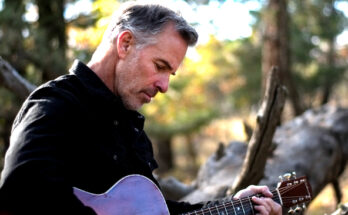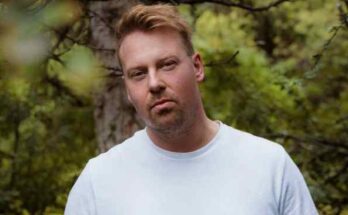By Lee Valentine Smith – Recently, I had the incredible honor of speaking with Prescott Niles of The Knack for a marathon interview session. The reason for our conversation was the release of The Knack’s Live At The House of Blues 2001, from the crafty folks at Liberation Hall and Smile Records. As the title states, this is The Knack captured live, but it’s not from the initial mania of the late ’79 – early ’80 era. That’s already been fully documented. This is the late-era edition of The Knack, recorded at the release party for their often-overlooked final studio record, Normal As The Next Guy. There was an eerie electricity in the air because the show happened on September 25th, 2001, just days after the horrific events of 9/11.
The lineup, as usual, was Doug Fieger on guitar and vocals, Berton Averre on lead guitar and Prescott Niles on bass and vocals. Along with new drummer Dave Henderson, the 2001 model Knack was a really smokin’ combo. The resulting collection covers tracks from their entire history and every stylistic approach, including a few surprises and choice covers.
Issued on blue vinyl for Record Store Day in April and on CD and digital in May, there’s no excuse not to grab a copy of this incredible document. It’s a solid piece of music history and a great addition to any Power Pop/’80s/legacy artist collection.
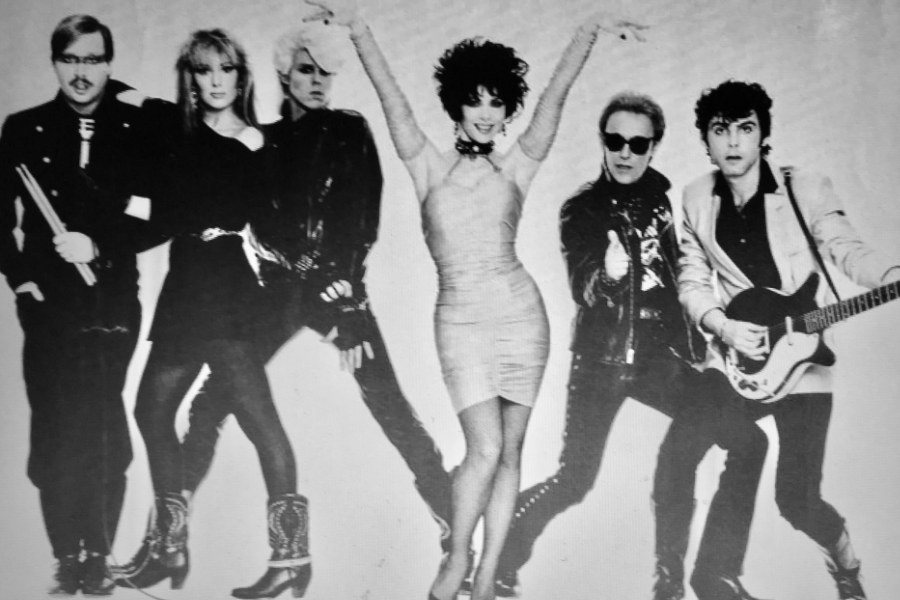
Here are a few highlights from an incredible conversation with the veteran bassist and raconteur. Niles is a journeyman musician who currently holds down the low end duties for revitalized ‘80s new wave hitmakers Missing Persons.
Thanks for your time today, Prescott.
I’m happy we have something new to talk about that’s timely – even though it’s an old record that happened a long time ago – but I’m grateful to be here.
When I first read the press release about the new House Of Blues record, I noticed it’s a nice little conduit in the band’s history. The final Knack studio record was released that same day.
Yeah, the album Normal as the Next Guy was our last official album. To me, Zoom (Rhino, July 1998) was the pinnacle and it bookended very well with our first album – in terms of writing, versatility and performances. It was really a progressive record and just a good pop album. Normal As The Next Guy had some good songs, too. But a lot of those songs were written when Doug was producing somebody else. When we got back together to record, a couple of those songs were made Knack songs – so it’s not truly a Knack album. The cover itself is kind of bizarre but I was glad that Tony [Valenziano] signed us to Smile. I had no idea he’d found this recording from the board from that show. Now here we are today, talking about it. I was shocked in a delightful way, because I had no idea it was even recorded, let alone it actually sounds really good. We have a good mix of songs on there as well.
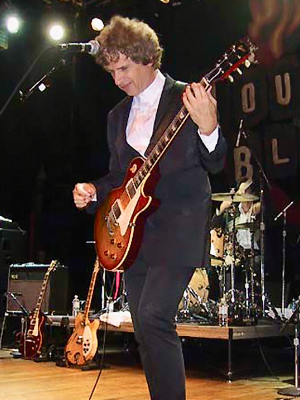
Obviously it’s from the Live at the Fun House era of the band.
Yes, that was our mock television show and it’s pretty good. Our performance on that was live as well, and I think more time was given to the recording of it. The show we did at the House of Blues was exciting and it captured the excitement of the performance. I just listened to it last night. On some of the tracks, I kept thinking, ‘Well, that’s pretty good and there’s a lot of energy.’ Probably a lot of it had a lot to do with playing after 9/11. I think we all wanted to just put out everything on that stage because of what had happened prior to that.
Right. It wasn’t that long after 9/11 and everyone was still pretty weirded out by the events of the day.
Very much so. If you really think about it, if we were in New York where I grew up, I think it was more devastating because every time you looked out your window, [it was like] ‘Where’s the skyline? What happened?’ It just reminded you of all of that. Out here in California, we knew about it and it was devastating of course, but it wasn’t nearly as shocking as it would’ve been back east. So the audience that came to the show were very, very happy to be out. It was like a coming out party. However, I do compare that to today’s world. I’m talking about playing the shows with Missing Persons, with people wearing masks in the audience. Now people are beginning to take their masks off and when I compare it to that time, that was nothing. Compared to today’s world, where even doing shows with people who are so worried about getting contaminated, it’s difficult to focus. This is the first time my choices directly affect other people, so therefore we’re codependent. It’s never happened before. Now my choices can affect the other guy and his kids and his family, so it’s a whole ‘nother standard.
Now since we’re talking about live performance and audience reaction/interaction, I saw The Knack a few years before this era. I was so impressed with the raw, kinetic energy of the band. As we know, the late ’90s-early 2000s Knack is a little different than the 1979 edition.
Well, yeah – but the only thing that really changed was the drummers. I mean, our first drummer, Bruce Gary – to be in a rhythm section with him was great. We’d met and played even before The Knack started. I would jam with him and we’d do these progressive rock things. His drumming, Berton’s exceptional guitar playing, Doug as a front man, writer and vocalist – and me of course – it was just something special. I’d never been in a band prior to that, where every part was equally strong. We just had an energy and it continued, even though we changed drummers. The tour you saw was probably when we had just done the Serious Fun album on Charisma [originally released in 1991]. We did have a hit from it, called “Rocket Of Love” – an FM hit, I should say. It was Top 10. It was a really cool song. Of course, we had to change our style, even though some of the structures were still very pop. But we were growing. Billy Ward played drums in those days. He’s a very, very cool drummer from New York but he was very different than Bruce.
He had some big shoes to fill.
Yeah. The album before that, obviously, was Round Trip which Jack Douglass produced in 1981, but for Serious Fun, Don Was produced it. He was good friends with Doug and he would always say, ‘You guys are such a great band. You just play and nail it. You don’t have to do 50 takes.’ Charisma unfortunately fell apart but we got a tour out of it at least. We did get some recognition and I think that album is good. I still play along to all the Knack records, not only to keep myself in shape but it’s like, ‘Wow, that’s cool.’ I continue to discover new things about each song that I took for granted back then.
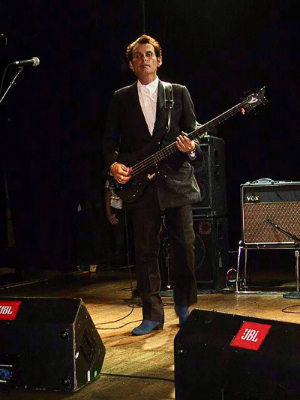
Every time you change a member of a band, obviously it alters the whole dynamic a bit. The band survived all those changes and actually improved with each phase – instead of merely fading out or crumbling away.
Well, crumbling away is a very good description. That’s a very strong visual. But maybe not ‘crumbling away,’ just in-fighting, or maybe just quarreling-away. Bruce was always Doug’s kryptonite in a way. Doug did have his degree of control of people. But with Bruce, he was a wild card and I think some of Bruce’s wildness, not so much in playing, but in his lifestyle maybe. Doug had to feel more like a parental role with him. That shouldn’t necessarily have been his role – but in a way it kept everybody tight and focused. None of us had any idea what was coming in terms of success. So in a way, there was an approach taken which was like we weren’t four individuals. We were a part of something – a group – which was elusive for all of us in different respects.
So at the end of the day, what Doug said was the law? Or was it some sort of a band democracy?
Well, it was a moving democracy. Let me put it like this: I tell people, ‘We were successful because of Doug – and in spite of Doug.’ He had a polarizing personality that some people just didn’t want to buy, but every lead singer has some arrogance. I mean, are you going to tell Steven Tyler to tone it down? So the ego thing maybe came from different places – but Bruce’s drumming, playing with him on the first three albums, nobody else could have played like him. After he left, we broke up. Then we did some demos with Pat Torpey, our later drummer, but he left us to play with Mr. Big. Then he came back in the last five years and he was terrific. Somehow, in the middle of all that, in a quirk of fate, Terry Bozzio was interested in us. He liked the music. I was very happy because he could play straight rock and he proved that on Zoom. We did a small tour with him. Unfortunately, Rhino didn’t really promote that record. But I will say, if you can find anybody who has a live cassette or a video of us playing with Terry, I’ll give up something vital, because I’ve never heard what we sounded like live with him. We did 15 shows and I’ve never found any recordings of any of it. I can’t believe it, so if you have any connections, please let me know because Terry was something else! I’d love to have heard the drum solos he played with The Knack.
Now, coming full circle, you have a nice connection with the whole Missing Persons family.
Yes, but it’s without Terry Bozzio! As you know, he’d already quit the band when I joined. He and Dale were married and they went their separate ways and Warren [Cuccurullo] had left. I do wish I had played in Missing Persons with Terry – in his band, with his songs, you know? But when Doug passed away on Valentine’s Day of 2010, Dale got in touch. She said she’d love for me to play in her band. So I’ve been playing with her pretty much on and off since then. Sometimes my son Gabe fills in on drums, so it really is like a family thing.
We should talk about the legacy of “My Sharona” as a performance piece.
Well, when we first did Sharona in rehearsal, Berton had actually brought in that riff and he and Doug hammered out the lyrics together. I have the first tape of us jamming on the riff. I’m playing funk! It’s very different. I was popping on it. On one of the early live shows, I think it’s on a live record released by Omnivore called Live in L.A., when you hear Sharona, we were still fleshing out the song and the solos. I mean, Berton did a five-minute solo alone – because we jammed. Then he honed it into what he wanted it to be for the studio solo. So that’s an example of that song especially, as well as “Selfish,” really becoming what they were by us playing them live to get them ready for the record.
Since you mentioned the extended solos Berton played in the early days, it’s important to note that the Knack could’ve easily veered over into prog-land, but you managed to stay on the pop side of the road.
(Laughs) I have rehearsal tapes of me, Berton and Bruce jamming and we’re doing Queen songs! We could play anybody’s stuff. We’d do Beatles or Stones songs by memory. We’d just go into them. Doug would sing along, on occasion. Whenever he broke a string live, we loved it because then we could jam! We do extended things like “Are You Experienced.” We did lots of covers. Sometimes people would say, ‘Hey, you covered “Last Train to Clarksville.” How come? I go, ‘Because we covered hundreds of songs. We loved that period and we loved pop music.’ We have a pretty darn good version of Clarksville on the House Of Blues record, actually. It’s got a lot of balls to it. We always loved throwing in some crazy covers. But that leads us to the question you haven’t asked yet – which is, how come you put “Tequila / Break On Through” on there?
I was definitely planning to mention that one.
That song is a good example of the jamming we’d do. Every time we’ve done it live with different drummers, that’s our 10-minute place to really jam. Sometimes I’d have a bass solo. Not on the live thing you’ve heard, but sometimes I’d step out while Berton does this wild, freakin’ solo. It’s six or seven minutes! Trust me, if he couldn’t handle it, we wouldn’t have been doing those long solos.
So how did it feel when The Knack was dismissed by certain critics as being an arrogant little pop band?
Well, they obviously hadn’t been to our shows. When we started playing in L.A., we were doing the usual two nights at every club you could play, it didn’t matter where. We were makin’ zip; sometimes maybe $50 a man. There’s this myth, you know about it, somebody even wrote something about it the other day. It’s like, The Knack, well where are they now? A product of Capitol Records who were looking to make the new Beatles and blah, blah, blah. I’ve heard that stuff for so long. It’s just BS. We played all those shows and the thing that gave us real credibility was when we started having people come up and jam with us. When we were playing The Starwood we had no record out at the time and Eddie Money would jam with us. We’d do “Two Tickets To Paradise” with him, for instance. At the Troubadour, Tom Petty jammed with us. If we weren’t good, he would’ve left. He wouldn’t have gotten up with us, but we did “Mona” and “Not Fade Away” with him. Then a little while later, Springsteen’s in the audience. He jammed on that one with us, too. And you know, Bruce wouldn’t have gotten up with us if we sucked. Stephen Stills also jammed with us at the Troubadour and wanted to produce us. But we never got that credit from some people. If we were this prefabricated band, why the hell did any of these people want to play with us? But the myth was written later. We lived it.
How do you feel when The Knack is labelled as a band with one big hit song?
We do get the rap that I hate so much. It’s called ‘one hit wonders,’ you know? I want to go, ‘No, we’re actually one-take wonders.’
That’s great.
Yeah, when people go, ‘What do you mean?’ I go, ‘That means we can go into the damn studio and record three songs in three hours. That means we’re great musicians and we know how to play our songs.’
Because you were ready.
Right. That, to me, what I think is really cool about the band, especially at that time period. You could get a producer who’d ask you to do 24 takes – just because he’s the producer and he wants to hear only what he wants to hear. When Mike Chapman produced our first album he’d say, ‘Look, I just want you guys to get it right. Where I need to produce, I’ll produce.’ So his biggest contribution was knowing what not to do. Doug has said, ‘Well, Mike didn’t do all that much.’ But I think by not interfering with a song, he did everything! By saying, ‘This is a great take, I’m going with this one,‘ he’s not asking us to do 10 takes, or over-producing it. He just let it go.
Was “My Sharona” a one-take wonder?
We did Sharona on the second day [of the session]. We’d usually do something called run-throughs, as they set up the board. Because they knew our sound by then, it was easy to set up the console and record. Mike always went, ‘Ok, let’s run it through.’ So we did the songs, beginning to end. When we did Sharona, Mike goes, ‘Okay, come on in and let’s hear it.’ And Doug says, ‘No, no. Let’s do another take.’ But Mike said, ‘No, you don’t need to.’ We go, ‘Huh? What do you mean?’ He goes, ‘I mean, we got it.’
The Knack – Live At The House Of Blues 2001 is available from most major music retailers and via www.liberationhall.com.
 INTERVIEW
INTERVIEW 